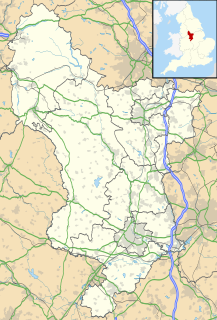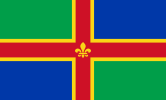Related Research Articles

Confession, in many religions, is the acknowledgment of one's sins (sinfulness) or wrongs.

Walsingham is a village in North Norfolk, England, famous for its religious shrines in honour of the Virgin Mary. It also contains the ruins of two medieval monastic houses.

Alford is a town in Lincolnshire, England, about 11 miles (18 km) north-west of the coastal resort of Skegness, at the foot of the Lincolnshire Wolds, which is an Area of Outstanding Natural Beauty. The population was recorded as 3,459 in the 2011 Census.

The Catholic Church, sometimes referred to as the Roman Catholic Church, is the largest Christian church, with approximately 1.3 billion baptised Catholics worldwide as of 2018. As the world's oldest and largest continuously functioning international institution, it has played a prominent role in the history and development of Western civilization. The church is headed by the Bishop of Rome, known as the pope. Its central administration is the Holy See.

Eucharistic discipline is the term applied to the regulations and practices associated with an individual preparing for the reception of the Eucharist. Different Christian traditions require varying degrees of preparation, which may include a period of fasting, prayer, repentance, and confession.

Bilsby is a village and civil parish in the East Lindsey district of Lincolnshire, England. It lies on the main A1111 road between Alford and Sutton-on-Sea, 1 mile (1.6 km) east of Alford. Thurlby and Asserby are hamlets within Bilsby parish. According to the 2001 census, the parish had a population of 415, which increased to 487 at the 2011 Census.

The Priory Church of St Peter with its monastery was founded in 1132 by Henry I for Augustinian Canons in Dunstable, Bedfordshire, England. St Peter’s today is only the nave of what remains of an originally much larger Augustinian priory church. The monastic buildings consisted of a dormitory for the monks, an infirmary, stables, workshops, bakehouse, brewhouse and buttery. There was also a hostel for pilgrims and travellers, the remains of which is known today as Priory House. Opposite the Priory was one of the royal palaces belonging to Henry I, known as Kingsbury.
Æthelwold was the first Bishop of Carlisle in medieval England.

Christianity and abortion has a long and complex history, and there are a variety of positions taken by contemporary Christian denominations on the topic. There is no explicit statement about abortion in either the Old Testament or the New Testament books of the Christian Bible. While some writers say that early Christians held different beliefs at different times about abortion, others say that, in spite of the silence of the New Testament on the issue, they condemned abortion at any point of pregnancy as a grave sin, a condemnation that they maintained even when some of them did not qualify as homicide the elimination of a fetus not yet "formed" and animated by a human soul. Some authors, such as ethicist Benjamin Wiker, have contrasted the prohibition of abortion in later Christian societies with the availability of abortion that was present in earlier Roman society, arguing that this reflects a wider condemnation of pagan practices.

The Priory Church of St Mary, Abergavenny is a parish church in the centre of Abergavenny in Monmouthshire, Wales.

The Priory of St Mary in the Meadow, also known as Beeston Priory is a former Augustinian Priory, located in the village of Beeston Regis, Norfolk, United Kingdom.
John Ley was an English clergyman and member of the Westminster Assembly.
The Catholic Church opposes all forms of abortion procedures whose direct purpose is to destroy a zygote, blastocyst, embryo or fetus, since it holds that "human life must be respected and protected absolutely from the moment of conception. From the first moment of his existence, a human being must be recognized as having the rights of a person – among which is the inviolable right of every innocent being to life." However, the Church does recognize as morally legitimate certain acts which indirectly result in the death of the fetus, as when the direct purpose is removal of a cancerous womb. Canon 1398 of the 1983 Code of Canon Law imposes automatic excommunication on Latin Catholics who procure a completed abortion, if they fulfill the conditions for being subject to such a sanction. Eastern Catholics are not subject to automatic excommunication, but by Canon 1450 of the Code of Canons of the Eastern Churches they are to be excommunicated by decree if found guilty of the same action, and they may be absolved of the sin only by the eparchial bishop. In addition to teaching that abortion is immoral, the Catholic Church also makes public statements and takes actions in opposition to its legality.

Caldwell Priory was a priory of Canons of the Holy Sepulchre in Bedfordshire, England, from circa 1154 to 1536. It was situated in the south-west of Bedford on the south bank of the River Great Ouse.

Gresley Priory was a monastery of Augustinian Canons regular in Church Gresley, Derbyshire, England, founded in the 12th century.

King's Mead Priory was a Benedictine Priory situated west of Derby, in the area currently known as Nun's Street, or Nun's Green. It was the only Benedictine Nunnery in Derbyshire.

Repton Priory was a priory in Repton, Derbyshire, England. It was established in the 12th century and was originally under the control of Calke Priory. It was dissolved in 1538.

Kyme Priory was a priory in South Kyme, Lincolnshire, England. What remains of the buildings are now part of Saint Mary and All Saints Church.

Sempringham Priory was a priory in Lincolnshire, England, located in the medieval hamlet of Sempringham, to the northwest of Pointon. Today, all that remains of the priory is a marking on the ground where the walls stood and a square, which are identifiable only in aerial photos of the vicinity. However, the parish church of St Andrew's, built around 1100 AD, is witness to the priory standing alone in a field away from the main road.

Longleat Priory was a priory near Warminster, Wiltshire, in the south of England. A short-lived priory was established and dissolved near to Longleat in the 12th century. The main priory was established before 1233 and was under the control of the Dean of Salisbury until its dissolution in 1529.
References
- 1 2 3 4 5 6 7 8 "House of Austin Canons - The Priory of Markby". Victoria County History. Retrieved 23 May 2011.
- 1 2 Historic England. "Monument No. 355445". PastScape. Retrieved 23 May 2011.
- ↑ "St Peters at Markby near Sutton On Sea". Sutton On Sea Website. Retrieved 23 May 2011.
- ↑ "Alford Group of Parishes". Alford Group of Parishes. Retrieved 23 May 2011.
- ↑ "British Listed Buildings". English Heritage. Retrieved 23 May 2011.
Coordinates: 53°17′05″N0°13′48″E / 53.28478°N 0.2299°E
| This article about a Lincolnshire building or structure is a stub. You can help Wikipedia by expanding it. |
| This article about a British Christian monastery, abbey, priory or other religious house is a stub. You can help Wikipedia by expanding it. |

